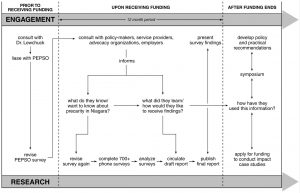Background
Technical Details
To collect the relevant data on workers’ experience with precarious employment, the lead researchers (Jeff Boggs and Jonah Butovsky) rely on two techniques: telephone surveys and interviews.
The first data collection technique is a telephone survey. Leger has been contracted to contact a random sample of Niagara telephone numbers and conduct the survey for the lead researchers. This survey is voluntary, and lasts about 20 minutes. Thus, only respondents who give consent to be surveyed are surveyed. Giving consent means that respondents are allowing the researchers to collect and analyze the data to better understand precarious employment in Niagara. What you say will be kept confidential to our research team, which includes staff from the United Way. Additionally, what you say might be used in possible future research to study precarious employment in Niagara.”
We collect the data by asking questions about an individual’s paid work, unpaid work, housing, education, stress and health. These responses will be kept confidential, and in many cases will also be treated as anonymous. We maintain confidentiality by separating an individual’s phone number (and first name, if that is needed for a call-back to complete the survey) from their response before analyzing the data. Furthermore, because we are looking for trends in the responses, similar individual responses will be grouped together. Given we aim for 700 completed surveys, nobody will be able to identify any one person’s answers to the survey questions. While future researchers might also use the data, they would have no access to the names or phone numbers, rendering the identities of participants anonymous. In instances where we think that other responses (i.e., answers to a specific question) would likely jeopardize a respondent’s anonymity, we would also suppress that particular response.
At the end of the telephone survey, respondents will be asked if they would like to participate in an interview one to three months later (conducted either in person or on the telephone, depending on scheduling and the respondent’s preference). This is the second data-collection technique. Consenting to a telephone interview allows respondents to go into more detail about their own precarious employment experience. All interviews will be conducted by a Brock research assistant. The interview will be recorded and transcribed. To keep the interview on track, the research assistant and researchers might design personalized questions based on the interviewees survey responses. These questions [i.e., what we call ‘probes’] will be designed to create a conversation about the interviewee’s precarious employment experience. This could last up to an hour, depending on the respondent’s interest. After being transcribed, the interviews will be analyzed for additional trends. In some cases, snippets from interviews will be used to illustrate particular trends or experiences in the final report and academic papers. While conversations about precarious employment may well be more personal than the survey, we insure all respondents’ confidentiality.
This entire research process is overseen and sanctioned by Brock University’s Research Ethics Board (REB). Our REB application file number is 16-236. The REB application and monitoring process insures that we conduct ourselves ethically while conducting this research and handle the data accordingly. This includes protecting the data from data breaches by keeping copies of the data in a locked room on computers behind an Internet fire wall, as well as maintain respondent’s confidentiality.
Project Timeline

